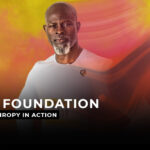The Wire caught up with our favourite Afrofuturist photographer, Osborne Macharia, to pick his brain on creativity, heritage and being one of the leading photographic influences on the African continent
Words: Nadine Oosthuizen

First off, what is your favourite picture you have ever taken?
LOL! I honestly do not have a favourite as I do get bored easily when it comes to my projects and hence that’s why I’m always on the search for new inspiration and the next project to work on.
Please tell us a little about yourself, who is Osborne Macharia?
Osborne Macharia is a simple perfectionist who is passionate about changing the narrative surrounding the continent. I’m a full-time commercial photographer and part-time visual artist whose style has come to be identified within the body of work known as Afrofuturism.
In our interview with the South African photographer Imraan Christian, he said that he is not a photographer, but an artist working in the medium of photography, film, and visual art. Do you feel the same way about your photography?
I would say that I am a photographer for sure but also more of a storyteller. The fact that I’m also a commercial photographer defines me as a photographer, so I end up playing two roles at the same time and I’m happy with that. My desire is to see these two worlds come together whereby commercial work is culturally centric. I’m actually working on something within these lines at the moment.

As a storyteller, I have noticed that all of your fictional characters have some sort of a power, from Globe-trotting Grannies to the illegal fight club. What influence do you hope these characters have on the viewer?
I hope that what I can do is inspire a generation of people who feel like they connect with their roots and are proud of their culture and identity, which somewhat has been diminished since time immemorial. I want people to connect with the characters, in as much as they are fictional stories, but know that each has an element of truth and reality hidden in the stories.
Besides dreaming up incredible narratives, what keeps you going?
I love watching movies that have a powerful story and cinematography to it. I’m also into typography, design, architecture and anything else that’s visually stimulating. The interesting part is that the best inspiration comes when I’m in passive mode, either when travelling, off on a hike or simply resting. I believe in giving your mind the rest it needs so that that the creative juice can keep flowing.

In an interview with Anish Kapoor on the impact of storytelling, he said that he has nothing to say as an artist. The journey of an artist is a journey of discovery. Do photography and art need to make an impact or have a message?
It definitely does have to have a message, that becomes the purpose. It doesn’t have to be that all the time, it could just be entertaining. A fusion of both is ideal so that its eye-catching at first then comes the message hidden somewhere in there.
What do you think is that magical quality all great artists poses? (OR some of the qualities needed to be a great artist perhaps?)
Respect for human dignity I believe is very important, its why we do what we do, to uplift humanity at the end of it all. A keen eye for detail is also important as well as being able to see your ideas and vision to the very end. I meet many people who talk about the projects they want to execute but those who succeed are the ones who carry it through to completion. You just have to go out and do it.
When does a work of art become important in your opinion? Do you need external confirmation, or is it something explicitly personal?
For me, the conceptual stage is critical. This is the stage when I vigorously evaluate my projects and make sure it falls within my key principles behind my work. When I get it right here then executing becomes manageable and I know I did my part. External confirmation becomes a bonus, but I’m always grateful for the feedback I get when a project goes live, it a confirmation that I am doing the right thing.

Who has had the biggest influence on your work?
I would say, Joey Lawrence and Dean Bradshaw. They are both strong commercial photographers and powerful storytellers when it comes to their personal projects. They document whats relevant and culturally appropriate for the times. Their lighting techniques and attention to detail are outstanding.
Did you grow up watching cartoons, or reading comic books? What other art forms influenced you and your work the most, please share a few of the things you can’t live without from a creative point of view.
I grew up watching lots of cartoons but not a fan of comic books as such. I do love digital matte paintings and they are a source of inspiration especially when it comes to Afrofuturistic content. From a creative point of view, it’s not photos that excite me first but rather viewing visually stimulating design be it graphics, product, architecture/interior or type. I just get excited when I see this and keeps me motivated to create good work.
Which other African photographers are worth collecting that’s on your radar?
Mutua Matheka, Joe Were, Thandiwe Muriu, Fabrice Monteiro, Aham Ibeleme, Emmanuel Bobbie, Jim Chuchu, Trevor (@the_mentalyts), Joseph Chege just to name a few

Which projects are you working on right now?
I never speak about this as I might jinx it but there are a couple of things in the pipeline.
Was there a definitive point where your passion became your career?
This was back in 2012 when I was studying Architecture and I had to stay out of school for one academic year. This is the point in time I picked up a camera and a year later I knew this is what I wanted to do in as much as there was not a distinctive long-term path in Kenya as to the future of someone wanting to get into commercial photography. A lot has changed since then and the world is now the playing field.
Lightfreaks is your initiative where you teach lighting techniques to the next generation of creative photographers. What is it that fascinates you most about lighting?
When I first came across Joey Lawrence’s work, his lighting that sparked a fire inside me and I knew that was what I need to focus on if I wanted to follow the same path. The reason why I teach on lighting is that It was hard for me to get material or proper mentorship and all that I know so far has been self-taught. If I can make it easier for others who are in the same predicament then I believe I would have done something meaningful.

Your list of accolades is long. Which of these achievements are you most proud of?
I would say being a speaker at this year’s Design Indaba. I learnt so much about myself and my worth as a creative that completely changed my perspective, my workflow and even the kind of work I choose to get hired for. I learnt that at the end of the day it’s all about PURPOSE
Do you have a motto? How has this contributed to your success?
Make sure your work is SHIT (forgive my French)
S– Simple
H– Honest. A true representation of who you are, not trying to be like someone else
I– Intentional. With purpose
T– Timeless. For this generation and the generations to come.
Follow Osborne on Instagram






One of the best interviews on photography, story telling and purpose. Keep on soaring Osborne.